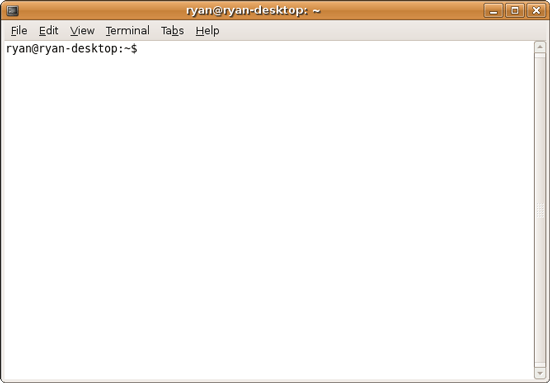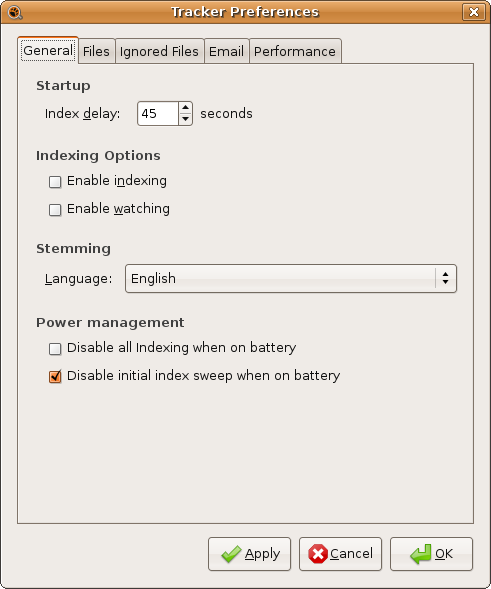Revisiting Linux Part 1: A Look at Ubuntu 8.04
by Ryan Smith on August 26, 2009 12:00 AM EST- Posted in
- Linux
The User Experience
Now that we’ve had a chance to go over the various features of Ubuntu and its included applications, we can get to the burning question: how is it?
In a nutshell, my own experience with Ubuntu has been that it’s capable of meeting 95% of my daily needs, and 75% of my weekly needs. Outside of the lack of the ability to sync my iPhone (which again is Apple’s fault), on any given day I did not need to boot up Windows. However in any given week I would need to boot in to Windows upwards of several times to run various Windows programs that don’t work under Wine or have a doppelganger for Ubuntu, not counting Windows games which also required booting back in to Windows. The result was that there was more dual booting than I would have liked, but it was acceptable.
What worked best for me under Ubuntu were the most common tasks, which makes sense given Ubuntu’s focus. We’ve already hit on how great Firefox is under Ubuntu, but also music playback, email, and word processing worked well. There was never any point where I felt like I could absolutely not accomplish something related to these tasks when using Ubuntu. However with that I will put the disclaimer that I didn’t find Ubuntu to be significantly better at any of these tasks – it was merely good enough.
If this sounds boring, it is. There’s not a lot to be said about otherwise mundane things that work well. Windows and Mac OS X could do these things, and so could Ubuntu. The distinguishing factor here really isn’t functionality; it’s that all of this was free.
In many situations Windows would still offer a better experience than Ubuntu. Sometimes this is a more polished GUI, as it is Ubuntu often looks like an orange version of Mac OS 9 (the bad Mac OS). Other times this would come down to professionally developed programs having an extra feature or two that while not critical, were nice to have. There are numerous little things like these that still keep Ubuntu well-separated from Windows and Mac OS X.

One item where I feel Ubuntu failed in particular is CLI use, which was a condition I outlined earlier. I wasn’t able to avoid using the CLI under Ubuntu, in fact I didn’t even come close. Some of this comes down to the fact that user generated support often uses CLI commands in lieu of instructions for dealing with the GUI, and in other situations such as mounting ISOs and installing video card drivers the situation was completely unavoidable. These are correctable problems.
Along those lines the default configuration of Ubuntu leaves me scratching my head. For example, Ubuntu has a file indexer and search system ala Windows Search and Spotlight. For whatever reason this indexer is not enabled by default and as a result it’s quite easy to miss. By the same token Compiz defaults to not using v-sync, which means windows will tear when moved. This is something hardware accelerated compositing specifically exists to solve. These items, along with finding a way (any way) to install the Microsoft Core Fonts by default so that the font disparity no longer exists would make the initial experience a better one.

The biggest negative influences in the Ubuntu experience were the items we listed under Things That Went Wrong. It’s easy to pick at things that don’t work, but these also happen to be the things that drove me out of Ubuntu for that moment. Meanwhile the biggest positive influences come down to Firefox and Totem. Neither is perfect, but as I discussed in their respective sections they’re great programs that are much better than the default programs found with Windows and Mac OS X.
Overall I found the Ubuntu experience to be decent, but not spectacular. Next to any issues listed out above, there’s a general lack of killer applications. As a result unless you specifically value the fact that it’s free (in either sense of the word) or the security benefits of it not being Windows, then there’s really nothing there that makes Ubuntu compelling compared to Windows or Mac OS X.










195 Comments
View All Comments
LittleMic - Wednesday, August 26, 2009 - link
http://en.wikipedia.org/wiki/NTFS_symbolic_link">http://en.wikipedia.org/wiki/NTFS_symbolic_linkWell, Windows 2000 had symbolic links for a long time :-p (only for directory until Vista though)
ekul - Wednesday, August 26, 2009 - link
ntfs has symlinks but the windows shell can't create or manipulate them. Pretty pointless. MS can (and does) use them in vista/7 but you can't make your ownEeqmcsq - Wednesday, August 26, 2009 - link
"hint: symlinks are your best friend. My home dir is littered with links to places on the filesystem I visit a lot to avoid a lot of clicking/typing"I use Gnome's bookmarks for that. Those bookmarks even include SMB shares on my other computers.
ekul - Wednesday, August 26, 2009 - link
gnome bookmarks are very handy I just find symlinks to be more flexible since they work regardless of gnome vs kde, gtk vs qt and gui vs cli. Even wine can take advantage of themjigglywiggly - Wednesday, August 26, 2009 - link
one more thing you should have covered is battery life on laptops. Linux in general is pretty awful at managing battery life. Just web browsing 4 hrs on Vista on my vostro 1310(not using 7) but with Ubuntu 2 1/2. It's a huge difference, but oh well.Ryan Smith - Wednesday, August 26, 2009 - link
Laptops are out of our domain, that would be Jarred. If this two-part series is successful, I'll see what I can do about talking him in to putting some Ubuntu (or any Linux for that matter) battery benchmarks in. But I'm told a complete workup takes a while.strikeback03 - Wednesday, August 26, 2009 - link
On my Thinkpad T43, battery life is essentially equal between XP and Ubuntu. Ubuntu may even be slightly better, though I have never bothered with a formal test to put real numbers on both. Have you looked at whether the processor is throttling down properly or not while in Ubuntu?sprockkets - Wednesday, August 26, 2009 - link
"Now we have yet to touch on hardware accelerated playback, which is something we’re going to hold off on until we take a look at Ubuntu 9.04. Linux does not have a common media framework like Windows and Mac OS X have DirectShow/DXVA and QuickTime respectively. Rather the desktop environment that Ubuntu is based off of (GNOME) includes a lesser framework called GStreamer, which is closer to a basic collection of codecs and an interface to them. As such hardware accelerated playback is not as easy to do under Ubuntu as it is under Windows and Mac OS X. We’ll take look at the APIs and the software for this in our look at Ubuntu 9.04."Well, not exactly. There is this: http://en.wikipedia.org/wiki/VaAPI">http://en.wikipedia.org/wiki/VaAPI, which is not exactly widespread yet. nVidia's VDPAU, which provides hardware acceleration for h.264 and if you have the latest version of PureVideo in your card, it does VC-1 as well. It can work with this or alone as well.
Also, while it is wacky that bin or binaries are in one spot, and lib or libraries are in another, and anything you install is in a /usr/lib/local, it does keep all related files in one spot. Keeping all your libraries registered as packages also makes it easy to repair.
Also, one click installs are possible on openSuSE as well, though it does involve a small gui process and adding a repository as well. But doesn't any program require this?
Also, I believe your problem with SMB shares is something I run into as well, but only on GNOME. On KDE, browsing shares is quite normal. Since I never bother mounting the share, I can't directly access it without KDE caching the file locally.
Isn't /home/$Your Name$ intuitive as to where your stuff would be? That is very nice, as I can keep my stuff separate from the OS, thus I can reformat the OS partition without having to touch my data. Imagine reinstalling Windows and finding all your apps working exactly as before with no work. Can OSX do that (not rhetorical)?
Ryan Smith - Wednesday, August 26, 2009 - link
VDPAU is something we'll specifically be covering in the Part 2; in fact it's what I'm working on at this moment.GeorgeH - Wednesday, August 26, 2009 - link
I'm sure the comment section will quickly be swamped with quibbles, so I just wanted to say that I found this article to be very informative, accurate (WRT my own Ubuntu experiences), and thorough. Kudos - now it's time to ask for a raise. :)